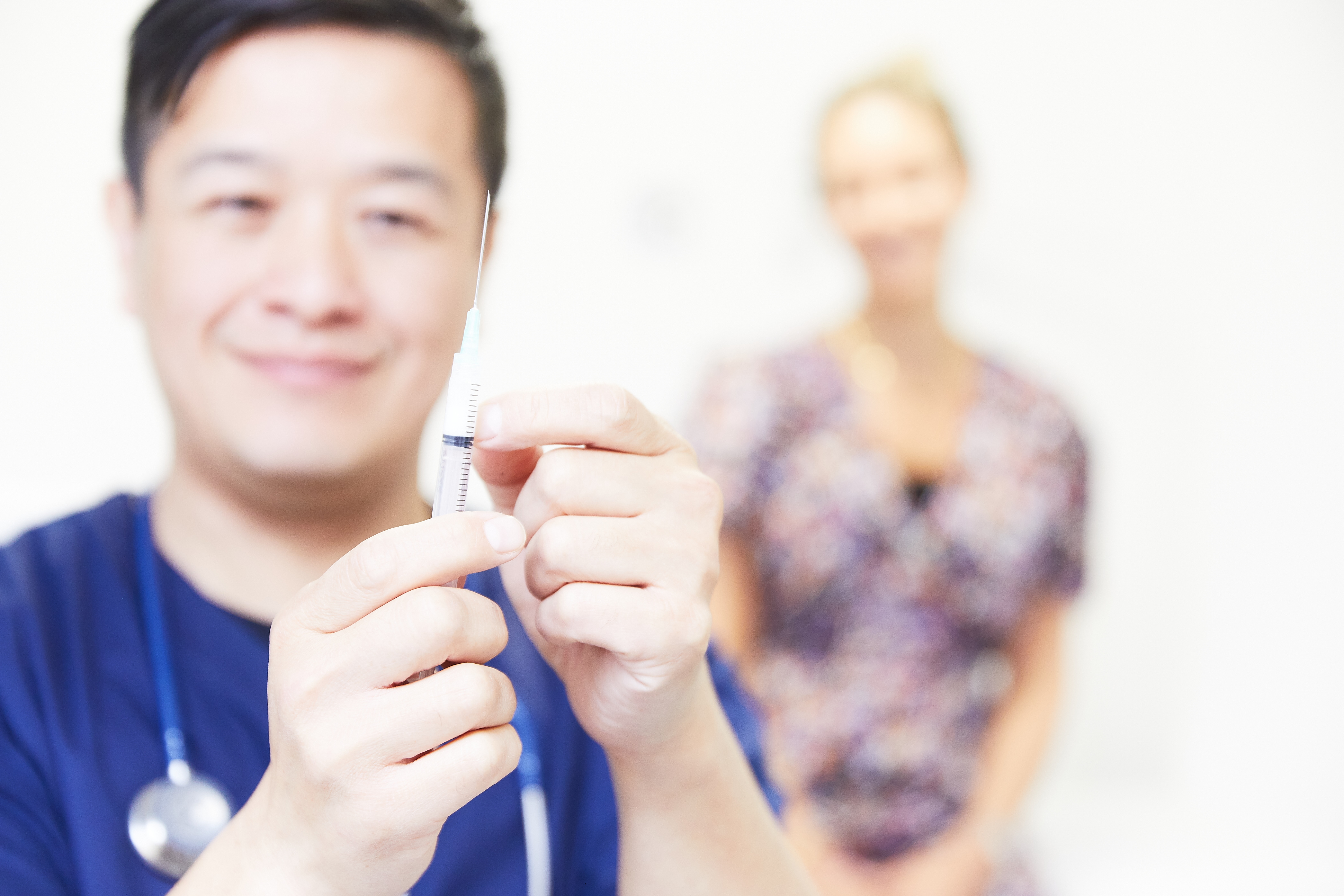Get the vaccinations you and your family need from our private clinics in Manchester, Liverpool and Newton-le-Willows. We have a full range of routine and travel vaccines for adults and children. We also offer non-NHS vaccinations including those needed by infants in the UK and for parents matching vaccines required by infants for the country of their birth/origin.

Vaccinations
We have introduced online booking to make things easier for you.

Vaccinations
All of our clinics are able to offer most travel jabs too. Our Manchester clinic is also able to offer Yellow Fever vaccines being a registered Yellow Fever Vaccination Centre (NaTHNaC). This is ideal if you are travelling abroad, or working abroad in an area that requires immunisations including Yellow Fever or need malaria medication. As with any other type of disease, prevention is the best protection!
All of our privately administered vaccinations include a short appointment with a qualified medical professional such as a GP or Nurse. If you are unsure about what vaccines you need, ask our helpful customer service team, or you can book a one-off consultation with a private GP or Nurse who can provide specific advice about the recommendations for the country you are visiting.
Our clinics are open 6 days a week from Monday to Saturday. We have same and next day appointments available, including times inside and outside of school & working hours for that extra convenience of fitting in with your home life. It’s easy to book your private jabs with Pall Mall Medical whether for yourself, your family or your children.
We have introduced online booking to make things easier for you.

What is the difference between vaccination and immunisation?
Vaccination is when a vaccine is administered (usually in the form of an injection into the body). Immunisation is what happens in your body after you have the vaccination. The vaccine stimulates your immune system to produce the antibodies it needs so that it can fight infections or viruses, and recognise disease and protect you from future infection (i.e. you become immune to the infection).
Travel Health Consultations & Malaria Tablet Advice
Pall Mall Medical now offer a full travel health consultation with a Nurse in Manchester City Centre, this covers:
- A detailed review of your medical history
- Risk assessment based on style and length of your trip
- Advice on preventative measures you can take to stay healthy
- Malaria tablet advice (plus prescription if needed); which ones to take, when to start/stop and how to take them
- Guidance on which medical kit you should travel with for peace of mind

Enquire About Our Services
A member of our team will be in touch with you to discuss your requirements.
Meet our GPs
Frequently Asked Questions.
Our expert team are always hand to help, advise and arrange appointments with our specialist consultants.
How long does a Yellow Fever vaccination last?
One dose of yellow fever vaccination will last at least 10 years and a booster vaccination is recommended after 10 years if you are still at risk from contracting the disease. After your initial vaccination you will be given a certificate to prove you have been vaccinated against the disease for 10 years from the date of vaccination.
Which countries do I need a Yellow Fever vaccination for?
Countries in South America including Brazil, Bolivia, Peru, Ecuador, Colombia, Venezuela, Panama, Guyana, Trinidad and Tobago, Suriname, French Guiana and parts of northern Argentina.
Most countries in central Africa have a high risk of yellow fever including Senegal, Guinea, Burkina Faso, Ghana, Nigeria, Cameroon, Democratic Republic of the Congo, Rwanda, Uganda, Angola and more. The vaccination is also recommended if you are travelling to parts of Kenya, Sudan, Ethiopia, Chad, Niger, Mali and Mauritania. If you are travelling near high risk countries central Africa or South America then speak to one of our GPs as you may be recommended to have injection if you are staying in an area for a long time or if you are in an area with a high exposure risk to mosquitos.
You will be asked to show a certificate of vaccination against yellow fever if you are travelling to high risk countries.
You can search which vaccinations you need for which country via our travel vaccinations page.
What are the side effects of the flu vaccinations?
Side-effects from the flu vaccination are rare but some people may develop a mild fever or achiness at the site of the injection.
The flu vaccination doesn’t actually contain an active flu virus in it so it doesn’t cause symptoms of flu.
I need vaccinations but I have a phobia of needles - what are my options?
Trynophobia is a fear of needles which can be so severe in some people that they will avoid having vaccinations.
Some vaccinations can be given in oral form rather than via injections, such as malaria, polio and rota virus vaccinations. However, many vaccinations can only be given by injection so if you suffer from trynophobia then it could be worth speaking to a cognitive behaviour therapist or a hypnotherapist to help you deal with your phobia.
What are the side effects of the hepatitis B vaccination?
Most people won’t experience any side-effects from the hepatitis B vaccination but some people may find that they develop some soreness at the injection site.
How long does the hepatitis B vaccination last?
Protection from hepatitis B lasts at least 20 years after a course of immunisation, where three injections are taken at intervals of 0, 1 and 6 months. However, individuals who are more at risk from hepatitis B are recommended to have a booster vaccination five years after the initial course of immunisation.
What travel vaccinations are safe to have during pregnancy?
Some travel vaccinations may case a risk to the baby during pregnancy. These include ‘live’ vaccinations which means they are prepared from a small amount of the virus which can replicate cells once inside the human body.
Live vaccinations are often used in travel vaccinations such as yellow fever and BGC (for tuberculosis) as well as the oral vaccination for typhoid. Speak to one of our GPs about the risks and benefits of having travel vaccinations – often it will be deemed less dangerous to take the vaccination if you cannot avoid travelling to a high risk country, rather than risking contracting an illness.
What vaccinations do I need during pregnancy?
Some vaccinations are recommended for pregnant women and include:
- The seasonal flu vaccination is usually given as soon as possible during pregnancy, particularly if you are pregnant during the flu season from September to February but can be given at any time of year and is safe for pregnancy.
- The whooping cough vaccination is recommended to pregnant women when they are between 28 and 38 weeks pregnant to protect the baby from whooping cough when it’s born.
- If you are at a higher risk of contracting hepatitis B, for example if you work in close contact with blood such as in health care or if you travel to countries where the risk is higher, then it may be advisable to have a hepatitis B vaccination when pregnant or planning to become pregnant. This vaccination is safe as there is no evidence that a hepatitis B vaccination harms unborn babies.
What should I look for in a clinic when considering private vaccinations?
Choosing a private clinic for a vaccination means you can be seen by an expert at a time convenient to you for a complete range of vaccinations. Clinic location is a key consideration for vaccinations so look for clinics in your local area as for many vaccinations you will need to visit the clinic more than once, Pall Mall Medical have facilitates in Manchester, Liverpool and Newton-le-Willows.
Choose a clinic which offers a full suite of vaccinations, particularly travel vaccinations where you may need more than one vaccination when traveling to certain areas, this way you can speak to an experts about all the vaccinations you may need for your trip. Look at what reviews and testimonials the clinic has to see the experience previous patients have had at the clinic.
How long does a flu vaccination last?
The flu jab is a short-term immunisation which lasts for a few months and is usually given to provide protection throughout the flu season. Yearly injections are advisable for people at risk from flu or complications from flu.
How long does the flu jab last?
The flu jab is a short-term immunisation which lasts for a few months and is usually given to provide protection throughout the flu season. Yearly injections are advisable for people at risk from flu or complications from flu.
Should I get a flu vaccination?
The flu vaccination is available to certain people on the NHS such as people over 65, pregnant women, carers, healthcare workers, residential care home residents and people with certain medical conditions. However, if you don’t fall into any of these categories and are worried about contracting flu then you can have a private flu vaccination at Pall Mall Medical at our Manchester, Liverpool or Newton-le-Willows locations.
What happens when children get chicken pox? Is it worth getting the vaccination?
Symptoms of chicken pox, although rarely serious, can be extremely uncomfortable for children and cause an extremely itchy rash, sickness, aches and pains and high temperatures and symptoms can last up to two weeks.
Vaccination against chicken pox is not routinely available on the NHS as usually once a child has had the illness, they develop immunity to it so are unlikely to get it again as children but may contract it again as adults in the form of shingles. It’s worth having your child immunised against chicken pox if you are worried about how they would cope with the symptoms of the virus.
How does the chicken pox vaccination work?
The chicken pox vaccination is a ‘live’ vaccination, meaning that it contains a weakened form of the chicken pox virus. The vaccination works by stimulating the body’s immune system so it responds to the chicken pox virus, without causing the illness, by creating antibodies to protect the body from the disease.
How old does my child need to be to have the chicken pox vaccination?
Children are usually given the chicken pox vaccination at 12-18 months and 4-6 years. If your child is older than this and hasn’t yet had chicken pox or a vaccination then speak to one of our GPs about immunising them against the disease.
Is the chicken pox vaccination suitable for adults?
Yes, the chicken pox vaccination is suitable for adults who are at a higher risk of contracting the disease, for example if they have a weak immune system or risk complications from catching chicken pox. The vaccination is also recommended for adults who work in healthcare or who care for people who are unwell.
How long does the MMR vaccination last for?
Protection from measles, mumps and rubella varies after the MMR injection with immunity against measles lasting approximately 30 years, rubella approximately 23 years and mumps approximately 19 years.
What are the side effects of Yellow Fever vaccinations?
The risk off side-effects from the yellow fever vaccination is low but some people may experience mild symptoms such as muscle pain, mild fever and headache.
We put you at the heart of everything we do

We put the patient at the heart of everything we do.
Pall Mall Medical is owned and led by doctors –which means care without compromise. We’re driven by how best we can deliver what you need from start to finish.
- Care Quality Commission Regulated.
- State-of-the-art facilities.
- No waiting lists.
- Rated 4.95 by our patients.
- No referrals required.
Always here to help, whenever you need us
Our expert team are always here to help, advise and arrange appointments with our specialist consultants.









